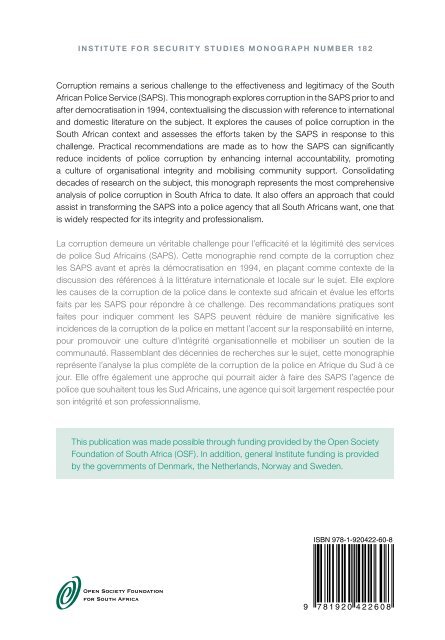Protector or predator? - Institute for Security Studies
Protector or predator? - Institute for Security Studies
Protector or predator? - Institute for Security Studies
You also want an ePaper? Increase the reach of your titles
YUMPU automatically turns print PDFs into web optimized ePapers that Google loves.
I n s t i t u t e F o r S e c u r i t y S t u d i e s M o n o g r a p h N u m b e r 1 8 2<br />
C<strong>or</strong>ruption remains a serious challenge to the effectiveness and legitimacy of the South<br />
African Police Service (SAPS). This monograph expl<strong>or</strong>es c<strong>or</strong>ruption in the SAPS pri<strong>or</strong> to and<br />
after democratisation in 1994, contextualising the discussion with reference to international<br />
and domestic literature on the subject. It expl<strong>or</strong>es the causes of police c<strong>or</strong>ruption in the<br />
South African context and assesses the eff<strong>or</strong>ts taken by the SAPS in response to this<br />
challenge. Practical recommendations are made as to how the SAPS can significantly<br />
reduce incidents of police c<strong>or</strong>ruption by enhancing internal accountability, promoting<br />
a culture of <strong>or</strong>ganisational integrity and mobilising community supp<strong>or</strong>t. Consolidating<br />
decades of research on the subject, this monograph represents the most comprehensive<br />
analysis of police c<strong>or</strong>ruption in South Africa to date. It also offers an approach that could<br />
assist in transf<strong>or</strong>ming the SAPS into a police agency that all South Africans want, one that<br />
is widely respected f<strong>or</strong> its integrity and professionalism.<br />
La c<strong>or</strong>ruption demeure un véritable challenge pour l’efficacité et la légitimité des services<br />
de police Sud Africains (SAPS). Cette monographie rend compte de la c<strong>or</strong>ruption chez<br />
les SAPS avant et après la démocratisation en 1994, en plaçant comme contexte de la<br />
discussion des références à la littérature internationale et locale sur le sujet. Elle expl<strong>or</strong>e<br />
les causes de la c<strong>or</strong>ruption de la police dans le contexte sud africain et évalue les eff<strong>or</strong>ts<br />
faits par les SAPS pour répondre à ce challenge. Des recommandations pratiques sont<br />
faites pour indiquer comment les SAPS peuvent réduire de manière significative les<br />
incidences de la c<strong>or</strong>ruption de la police en mettant l’accent sur la responsabilité en interne,<br />
pour promouvoir une culture d’intégrité <strong>or</strong>ganisationnelle et mobiliser un soutien de la<br />
communauté. Rassemblant des décennies de recherches sur le sujet, cette monographie<br />
représente l’analyse la plus complète de la c<strong>or</strong>ruption de la police en Afrique du Sud à ce<br />
jour. Elle offre également une approche qui pourrait aider à faire des SAPS l’agence de<br />
police que souhaitent tous les Sud Africains, une agence qui soit largement respectée pour<br />
son intégrité et son professionnalisme.<br />
This publication was made possible through funding provided by the Open Society<br />
Foundation of South Africa (OSF). In addition, general <strong>Institute</strong> funding is provided<br />
by the governments of Denmark, the Netherlands, N<strong>or</strong>way and Sweden.<br />
ISBN 978-1-920422-60-8<br />
9 7 8 1 9 2 0 4 2 2 6 0 8

















